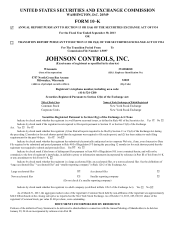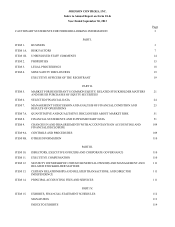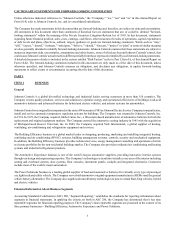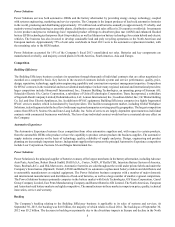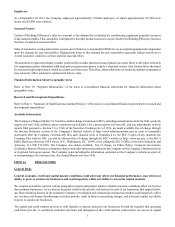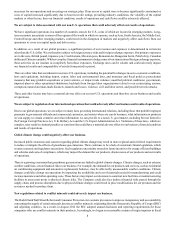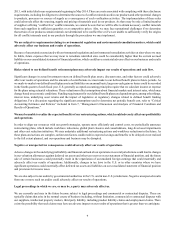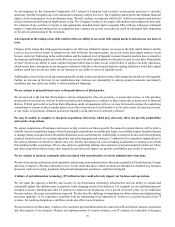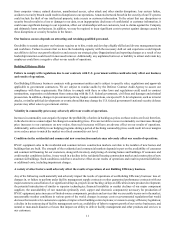Johnson Controls 2013 Annual Report Download - page 8
Download and view the complete annual report
Please find page 8 of the 2013 Johnson Controls annual report below. You can navigate through the pages in the report by either clicking on the pages listed below, or by using the keyword search tool below to find specific information within the annual report.8
necessary for our operations and executing our strategic plan. If our access to capital were to become significantly constrained or
costs of capital increased significantly due to lowered credit ratings, prevailing industry conditions, the volatility of the capital
markets or other factors, then our financial condition, results of operations and cash flows could be adversely affected.
We are subject to risks associated with our non-U.S. operations that could adversely affect our results of operations.
We have significant operations in a number of countries outside the U.S., some of which are located in emerging markets. Long-
term economic uncertainty in some of the regions of the world in which we operate, such as Asia, South America, the Middle East,
Central Europe and other emerging markets, could result in the disruption of markets and negatively affect cash flows from our
operations to cover our capital needs and debt service.
In addition, as a result of our global presence, a significant portion of our revenues and expenses is denominated in currencies
other than the U.S. dollar. We are therefore subject to foreign currency risks and foreign exchange exposure. Our primary exposures
are to the euro, British pound, Japanese yen, Czech koruna, Mexican peso, Romanian lei, Hungarian forint, Polish zloty, Canadian
dollar and Chinese renminbi. While we employ financial instruments to hedge some of our transactional foreign exchange exposure,
these activities do not insulate us completely from those exposures. Exchange rates can be volatile and could adversely impact
our financial results and comparability of results from period to period.
There are other risks that are inherent in our non-U.S. operations, including the potential for changes in socio-economic conditions,
laws and regulations, including import, export, labor and environmental laws, and monetary and fiscal policies; protectionist
measures that may prohibit acquisitions or joint ventures, or impact trade volumes; unsettled political conditions; government-
imposed plant or other operational shutdowns; backlash from foreign labor organizations related to our restructuring actions;
corruption; natural and man-made disasters, hazards and losses; violence, civil and labor unrest, and possible terrorist attacks.
These and other factors may have a material adverse effect on our non-U.S. operations and therefore on our business and results
of operations.
We are subject to regulation of our international operations that could adversely affect our business and results of operations.
Due to our global operations, we are subject to many laws governing international relations, including those that prohibit improper
payments to government officials and commercial customers, and restrict where we can do business, what information or products
we can supply to certain countries and what information we can provide to a non-U.S. government, including but not limited to
the Foreign Corrupt Practices Act, U.K. Bribery Act and the U.S. Export Administration Act. Violations of these laws, which are
complex, may result in criminal penalties or sanctions that could have a material adverse effect on our business, financial condition
and results of operations.
Global climate change could negatively affect our business.
Increased public awareness and concern regarding global climate change may result in more regional and/or federal requirements
to reduce or mitigate the effects of greenhouse gas emissions. There continues to be a lack of consistent climate legislation, which
creates economic and regulatory uncertainty. Such regulatory uncertainty extends to future incentives for energy efficient buildings
and vehicles and costs of compliance, which may impact the demand for our products, obsolescence of our products and our results
of operations.
There is a growing consensus that greenhouse gas emissions are linked to global climate changes. Climate changes, such as extreme
weather conditions, create financial risk to our business. For example, the demand for our products and services, such as residential
air conditioning equipment and automotive replacement batteries, may be affected by unseasonable weather conditions. Climate
changes could also disrupt our operations by impacting the availability and cost of materials needed for manufacturing and could
increase insurance and other operating costs. These factors may impact our decisions to construct new facilities or maintain existing
facilities in areas most prone to physical climate risks. The Company could also face indirect financial risks passed through the
supply chain, and process disruptions due to physical climate changes could result in price modifications for our products and the
resources needed to produce them.
New regulations related to conflict minerals could adversely impact our business.
The Dodd-Frank Wall Street Reform and Consumer Protection Act contains provisions to improve transparency and accountability
concerning the supply of certain minerals, known as conflict minerals, originating from the Democratic Republic of Congo (DRC)
and adjoining countries. As a result, in August 2012 the SEC adopted annual disclosure and reporting requirements for those
companies who use conflict minerals in their products. Accordingly, we began our reasonable country of origin inquiries in fiscal

